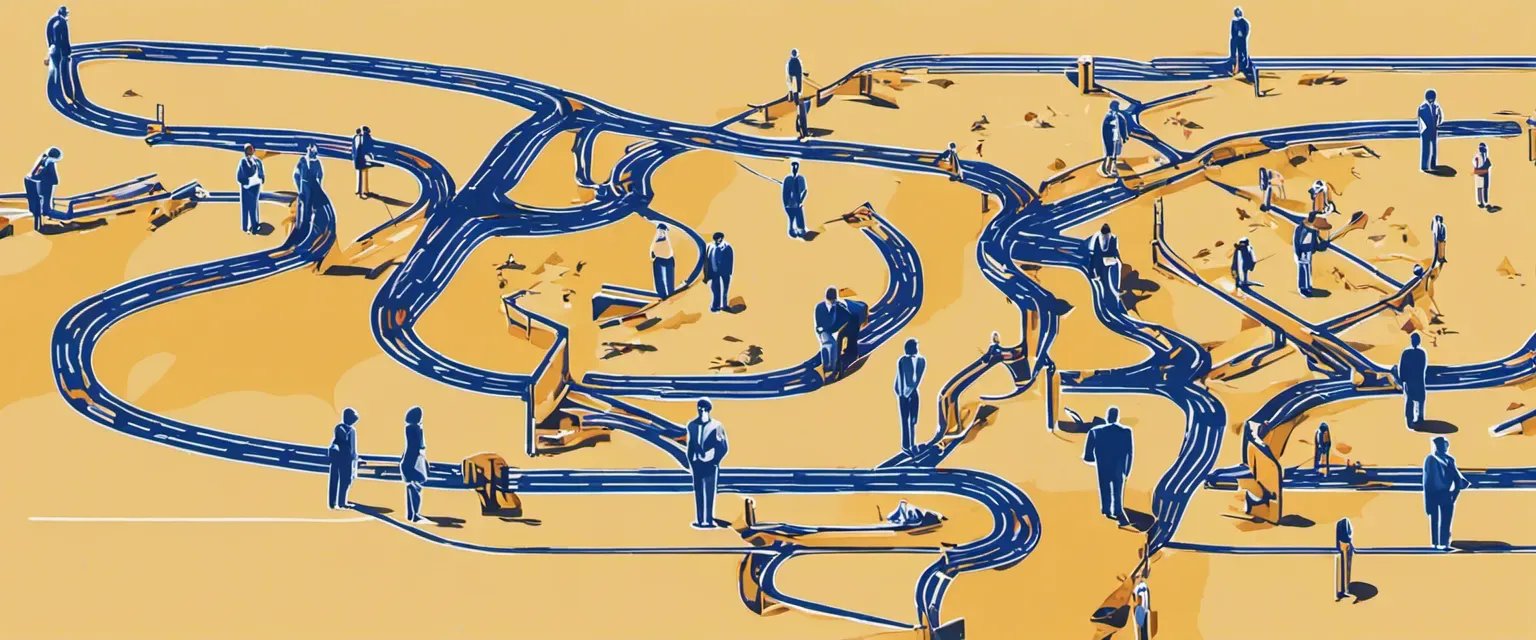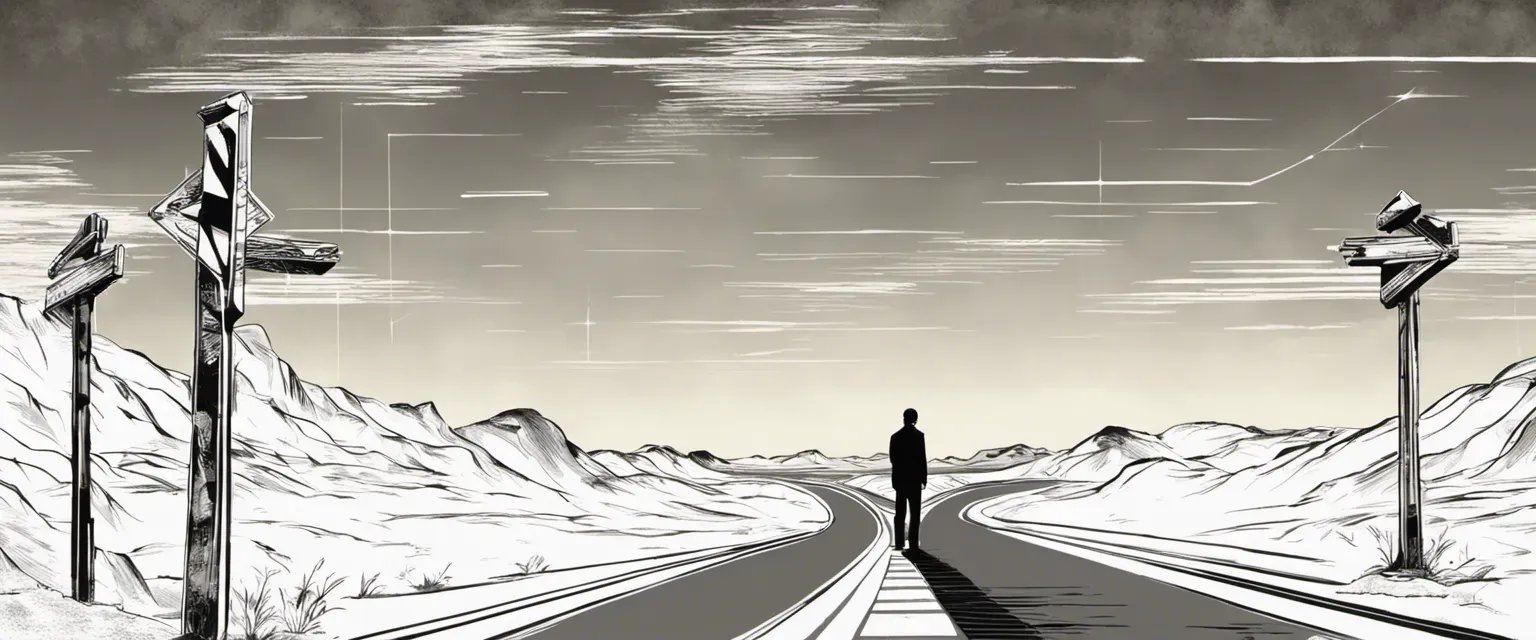The Paradox of Choice: Balancing Freedom and Overwhelm

"The Paradox of Choice" explores the impact of excessive options on decision-making, highlighting how too much choice can lead to anxiety and dissatisfaction.
 Chapter 1 Delve deeper into The Paradox of Choice's message
Chapter 1 Delve deeper into The Paradox of Choice's message
The Paradox of Choice: Why More Is Less is a book written by psychologist Barry Schwartz. It explores the idea that having an abundance of choices might not always lead to better outcomes and increased satisfaction. Schwartz argues that having too many options can lead to decision-making paralysis, increased regret, and decreased happiness.
According to Schwartz, although having options can initially seem empowering, it often becomes overwhelming as individuals feel the pressure to make the best choice among numerous possibilities. This abundance of choices can lead to decision fatigue, where individuals become mentally exhausted by evaluating each option and weighing the pros and cons. As a result, people may end up feeling less satisfied with their decision, constantly questioning if they could have made a better choice.
Another aspect of the paradox of choice explored by Schwartz is the concept of opportunity cost. When faced with a wide range of options, individuals may continually consider the other possibilities they didn't choose. This leads to feelings of regret and a constant comparison to alternative paths not taken.
Schwartz suggests that an ideal balance between choice and simplicity is necessary to avoid the negative consequences of excessive options. He advises individuals to focus on what they truly value and prioritize their preferences, limiting unnecessary choices to prevent decision overload.
Overall, The Paradox of Choice presents a thought-provoking perspective on the impact of too many choices on individuals' well-being and offers insights on how to navigate decision-making in a world of abundance.
Chapter 2 Is The Paradox of Choice Worth Reading?
The Paradox of Choice by Barry Schwartz is generally considered to be a good book. It explores the concept of choice and the impact it has on our lives, arguing that an abundance of choices may lead to decision paralysis, dissatisfaction, and regret. Schwartz suggests that having too many options can decrease our overall well-being and offers insights into how to navigate this paradox. The book has received positive reviews for its thought-provoking content and practical advice on simplifying decision-making. However, personal opinions may vary, so it is advisable to read a few reviews or summaries to determine if the book aligns with your interests and goals.
Chapter 3 Brief Description of The Paradox of Choice
"The Paradox of Choice" by Barry Schwartz explores the idea that having too many choices can actually lead to unhappiness and indecision. Schwartz argues that although having choices is often seen as a positive thing, it can also be overwhelming and burdensome.
Schwartz begins by discussing how the increase in options in modern society has resulted in a paradoxical decrease in satisfaction. He cites examples such as shopping for jeans or ordering food at a restaurant, where having a multitude of options can lead to uncertainty and dissatisfaction. Schwartz suggests that this is because having too many choices creates unrealistic expectations, as there is always the possibility of finding something better.
Furthermore, Schwartz explains that having too many choices can also lead to decision paralysis. When faced with numerous options, people may struggle to make a decision, fearing that they will make the wrong choice and regret it later. This can lead to feelings of anxiety and dissatisfaction.
Schwartz then explores the concept of "maximizers" and "satisficers." Maximizers are individuals who constantly seek the best option, often feeling a sense of disappointment and regret when they make a choice. On the other hand, satisficers are individuals who are content with finding an option that meets their basic criteria. Schwartz argues that satisficers tend to be happier and less stressed than maximizers, as they are not constantly burdened by the fear of making the wrong choice.
In the latter part of the book, Schwartz suggests strategies for managing choice overload. He emphasizes the importance of setting clear criteria when making decisions and not obsessing over finding the absolute best option. He also suggests that limiting options and not comparing every possible choice can lead to greater satisfaction.
Overall, "The Paradox of Choice" highlights the negative impact that an abundance of choices can have on our well-being. It encourages readers to rethink their approach to decision-making in order to find greater happiness and contentment in a world filled with endless options.
Chapter 4 About The Paradox of Choice's Author
The author of the book "The Paradox of Choice" is Barry Schwartz. He released this book in 2004.
Barry Schwartz has written several other books apart from "The Paradox of Choice." Here are some notable ones:
- "Why We Work" (2015): This book explores the significance and meaning of work in our lives.
- "The Costs of Living: How Market Freedom Erodes the Best Things in Life" (1994): In this book, Schwartz examines how market-oriented thinking can negatively impact aspects of life that should be considered priceless.
- "Practical Wisdom: The Right Way to Do the Right Thing" (2011, co-authored with Kenneth Sharpe): This book delves into the important concept of practical wisdom and its application in various life domains.
In terms of editions, it would depend on personal preference and the specific topic of interest. "The Paradox of Choice" has not undergone significant revisions or updates since its initial release.
Chapter 5 Central Idea of The Paradox of Choice
The Paradox of Choice Meaning
The Paradox of Choice is a concept introduced by psychologist Barry Schwartz in his book of the same name. It refers to the notion that having too many options or choices can actually lead to feelings of unhappiness, dissatisfaction, and a significant decrease in the ability to make decisions.
Schwartz argues that while having choices is generally seen as a positive thing, it can also be overwhelming and lead to decision paralysis. When faced with a multitude of options, people tend to experience anxiety, fear of making the wrong decision, and a fear of missing out on something better. This can ultimately lead to a state of dissatisfaction, as the abundance of choices raises expectations and makes it difficult to fully commit to any one option.
The Paradox of Choice can be seen in various aspects of everyday life, such as shopping, careers, relationships, and even simple decisions like selecting a toothpaste. The more choices there are, the more difficult it becomes to make a decision and the more regrets or doubts one may have after making a choice.
Schwartz suggests that rather than striving for the "perfect" choice, individuals should aim for "good enough" options. By limiting options and focusing on what truly matters, people can alleviate the stress and potential dissatisfaction that comes with excessive choices.
Overall, the meaning of The Paradox of Choice is that while choice and freedom are important, an excess of choices can lead to negative consequences. Simplifying decision-making processes and focusing on what truly matters can lead to greater happiness and satisfaction in life.
The Paradox of Choice Theme
The main theme of "The Paradox of Choice" by Barry Schwartz is the negative impact of too many choices on individuals and society.
Throughout the book, Schwartz argues that while having options can initially seem beneficial, it often leads to decision paralysis, dissatisfaction, and regret. He suggests that the abundance of choices in our modern world has led to increased anxiety and decreased well-being.
Schwartz explores various aspects of this theme, including the psychological implications of choice overload, the cultural influences on our decision-making, and the role of advertising in perpetuating the idea that more choices equate to more freedom and happiness.
Additionally, Schwartz examines the concept of satisficers (people who make a decision once their criteria are met) versus maximizers (people who constantly search for the best option). He argues that maximizers are more prone to decision fatigue and regret, while satisficers tend to be more content with their choices.
Overall, the theme of "The Paradox of Choice" suggests that while having options can be beneficial, there is a point where too much choice becomes overwhelming and detrimental to individual well-being. Schwartz advocates for a more mindful approach to decision-making and urges society to reconsider the emphasis on unlimited choices as the key to happiness.
Chapter 6 Other Alternative Available Resources
- Book: "The Paradox of Choice: Why More Is Less" by Barry Schwartz
- The original book by Barry Schwartz explores the concept of how having too many choices can lead to decision paralysis and dissatisfaction.
- TED Talk: "The Paradox of Choice" by Barry Schwartz
- A popular TED Talk where Barry Schwartz gives a condensed version of his book's main ideas, discussing the paradox of choice and its impact on decision-making.
- TED-Ed Lesson: "The Paradox of Choice" by Barry Schwartz
- An animated video based on Barry Schwartz's TED Talk, explaining the paradox of choice in a more visually engaging way.
- Podcast: "The Paradox of Choice" (Hidden Brain)
- The Hidden Brain podcast hosted by Shankar Vedantam features an episode on the paradox of choice, where they discuss Barry Schwartz's research and how it influences our decision-making.
- Article: "The Psychology of Choice: Why We Struggle with Decisions" (Verywell Mind)
- This article explores the psychological effects of having too many choices, referencing Barry Schwartz's work and providing insights on decision paralysis.
- Video: "The Paradox of Choice: Why More Is Less" (YouTube)
- A video summary of Barry Schwartz's book, presenting key ideas and concepts in a concise format.
- Interview: "How to Make Decisions when Faced with the Paradox of Choice" (Harvard Business Review)
- An interview with Barry Schwartz discussing the paradox of choice in relation to decision-making at both personal and professional levels.
- Blog Post: "Overcoming the Paradox of Choice: Strategies for Decision-Making" (Psychology Today)
- A blog post that delves into the paradox of choice and provides practical strategies for managing decision overload, drawing from Barry Schwartz's research.
- Scientific Paper: "The Paradox of Choice: A Meta-Analytic Review" (Journal of Personality and Social Psychology)
- This academic paper by Barry Schwartz and Andrew Ward reviews numerous studies related to the paradox of choice, summarizing and analyzing the findings on how choice overload affects individuals.
- Website: Barry Schwartz Official Website (https://barryschwartz.com/)
- Barry Schwartz's official website where you can find more resources and information related to his work, including the paradox of choice.
Chapter 7 QMeaningful Sentences in The Paradox of Choice
The Paradox of Choice quotes as follows:
- "The more options there are, the easier it is to regret anything at all that is disappointing about the option that you chose."
- "With so many options to choose from, people often feel overwhelmed and paralyzed by the fear of making the wrong choice."
- "We are better off with limits on our choices, as it eliminates unnecessary stress and allows us to focus on what truly matters."
- "Choice overload leads to decision fatigue and decreases our overall level of happiness and satisfaction."
- "Seeking perfection in every choice is an impossible task that only leads to disappointment and unhappiness."
- "Having too many choices can actually undermine our sense of freedom and autonomy."
- "When confronted with too many options, we often default to making no choice at all, which can lead to missed opportunities and regrets."
- "Simplifying our choices can lead to a more fulfilling and meaningful life."
- "Finding ways to limit options and focus on what truly matters can lead to greater happiness and contentment."
- "There is a fine line between having enough choices to feel empowered and having too many choices that lead to decision paralysis."
Chapter 8 Similar Recommendations for The Paradox of Choice
- "Sapiens: A Brief History of Humankind" by Yuval Noah Harari - Explores the history of Homo sapiens from the emergence of archaic human species to the modern world, offering insightful perspectives on human evolution, social development, and the impact of technology.
- "Thinking, Fast and Slow" by Daniel Kahneman - A fascinating exploration of the two systems of thinking that drive our decisions and judgments. Kahneman, a Nobel laureate, explores the biases and cognitive illusions that influence our everyday lives, providing a deep understanding of human behavior.
- "Flow: The Psychology of Optimal Experience" by Mihaly Csikszentmihalyi - Csikszentmihalyi explores the concept of "flow," a state of heightened focus and enjoyment that leads to optimal human experiences. By delving into the psychology behind finding fulfillment and happiness in our activities, this book offers valuable insights for personal growth.
- "Quiet: The Power of Introverts in a World That Can't Stop Talking" by Susan Cain - This thought-provoking book unravels the power of introversion, challenging the societal bias toward extroverts. Cain explores the unique strengths of introverts, shedding light on their contributions and offering valuable advice for both introverts and extroverts alike.
- "Man's Search for Meaning" by Viktor E. Frankl - In this deeply moving memoir, Frankl chronicles his experiences as a Holocaust survivor and his journey to find meaning in life. Drawing on his background in psychology, he delves into the human desire for purpose and explores how individuals can find meaning and purpose even in the most difficult circumstances. A profound and compelling read that offers valuable lessons for personal growth and introspection.




